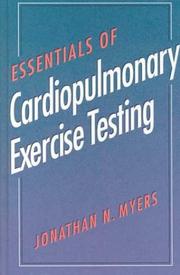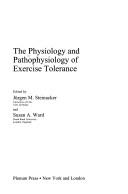| Listing 1 - 10 of 11 | << page >> |
Sort by
|
Book
Year: 1984 Publisher: Bruxelles: UCL. Faculté de médecine,
Abstract | Keywords | Export | Availability | Bookmark
 Loading...
Loading...Choose an application
- Reference Manager
- EndNote
- RefWorks (Direct export to RefWorks)
Heart Function Tests --- Exercise Tolerance --- Oxygen Consumption
Book
ISBN: 9781975197070 1975197070 Year: 2023 Publisher: LWW
Abstract | Keywords | Export | Availability | Bookmark
 Loading...
Loading...Choose an application
- Reference Manager
- EndNote
- RefWorks (Direct export to RefWorks)
"ACSM's Exercise Testing and Prescription takes the content from the bestselling ACSM's Guidelines for Exercise Testing and Prescription and delivers it in a pedagogically-oriented format. It walks students through the process of selecting and administering fitness assessments, interpreting the results, and creating an exercise/fitness plan that that responds to those results and the needs of each individual. This is a textbook for the exercise testing and prescription course (or courses) that appear in every undergraduate exercise science program, and which prepare students to collect, interpret, and act upon"--
Book
ISBN: 9783318023329 9783318023336 3318023337 3318023329 Year: 2013 Publisher: S. Karger
Abstract | Keywords | Export | Availability | Bookmark
 Loading...
Loading...Choose an application
- Reference Manager
- EndNote
- RefWorks (Direct export to RefWorks)
Dietary Supplements. --- Exercise Tolerance --- Nutritional Physiological Phenomena. --- Physical Fitness --- Physiology. --- Physiology.
Book
ISBN: 9781496338792 1496338790 Year: 2018 Publisher: Philadelphia Wolters Kluwer
Abstract | Keywords | Export | Availability | Bookmark
 Loading...
Loading...Choose an application
- Reference Manager
- EndNote
- RefWorks (Direct export to RefWorks)
Medicine, Physical --- Exercise tests --- Exercise therapy --- Exercise Test --- Exercise Tolerance --- Exercise Therapy
Book
ISBN: 9781138610187 9781498775441 Year: 2019 Publisher: Boca Raton, FL : CRC Press/Taylor & Francis Group,
Abstract | Keywords | Export | Availability | Bookmark
 Loading...
Loading...Choose an application
- Reference Manager
- EndNote
- RefWorks (Direct export to RefWorks)
Exercise Test. --- Lung Diseases --- Cardiovascular Diseases --- Exercise Tolerance. --- Heart Function Tests. --- Respiratory Function Tests. --- Poumon --- Appareil cardiovasculaire --- Épreuve d'effort --- Condition physique --- diagnosis. --- diagnosis. --- Maladies --- Diagnostic. --- Maladies --- Diagnostic.

ISBN: 0873226364 Year: 1996 Publisher: Champaign Human kinetics
Abstract | Keywords | Export | Availability | Bookmark
 Loading...
Loading...Choose an application
- Reference Manager
- EndNote
- RefWorks (Direct export to RefWorks)
Exercise Test --- Exercise Tolerance --- Pulmonary Ventilation --- Respiratory Transport --- Cardiopulmonary system --- Exercise tests --- Heart function tests --- Pulmonary function tests. --- Appareil cardiopulmonaire --- Epreuves d'effort --- Coeur --- Appareil respiratoire --- Diseases --- Diagnosis --- Maladies --- Diagnostic --- Exploration fonctionnelle --- 796.012 --- -Exercise tests --- Pulmonary function tests --- Function tests, Pulmonary --- Lung function tests --- Respiratory function tests --- Function tests (Medicine) --- Cardiac function tests --- Exercise --- Cardiopneumatic system --- Cardiorespiratory system --- Pneumocardial system --- Organs (Anatomy) --- Movement and motor functions: tests and measurement --- -Diagnosis --- Physiological aspects --- Testing --- 796.012 Movement and motor functions: tests and measurement --- Diseases&delete& --- Exercise Test. --- Exercise Tolerance. --- Pulmonary Ventilation. --- Respiratory Transport.
Book
ISBN: 9782804181604 280418160X Year: 2013 Publisher: Bruxelles : De Boeck,
Abstract | Keywords | Export | Availability | Bookmark
 Loading...
Loading...Choose an application
- Reference Manager
- EndNote
- RefWorks (Direct export to RefWorks)
Le système cardiovasculaire occupe une place centrale dans les adaptations de l'organisme aux contraintes du sport. Il peut parfois être le "maillon faible" du pratiquant et être alors à l'origine d'accidents potentiellement graves. Les adaptations du système cardiovasculaire à l'exercice musculaire, détaillés dans cet ouvrage, sont doubles : aiguës, contemporaines de l'effort, et chroniques, induites par un entraînement intense et prolongé. Les caractéristiques des contraintes de la pratique sportive et des adaptations qui en découlent varient selon les disciplines, le mode de pratique et les spécificités du pratiquant. Elles doivent être connues pour permettre à chaque sportif de tirer le meilleur bénéfice de sa pratique individuelle avec le meilleur niveau de sécurité possible. Cet ouvrage largement illustré se propose donc de répondre aux questions que les personnes impliquées dans le monde du sport se posent sur les relations parfois tumultueuses qui peuvent exister entre le coeur et le sport. Le but de ce livre est d'accompagner les professionnels de la santé, impliqués dans le monde du sport, afin qu'ils soient en mesure d'adapter une pratique sportive à toutes les personnes demandeuses. (4ème de couverture).
Sports Medicine --- Athletic Performance --- Cardiovascular System --- Cardiovascular system --- Athletes --- Athletic ability --- Sports medicine --- Appareil cardiovasculaire --- Sportifs --- Sports, Aptitude pour les --- Médecine du sport --- Medical examinations --- Examens médicaux --- Médecine du sport --- Examens médicaux --- Sports Medicine. --- Athletic Performance. --- Cardiovascular System. --- Cardiovascular diseases --- Exercise tolerance --- prevention & control --- physiology --- methods

ISBN: 0306454920 1461377005 1461558875 Year: 1996 Publisher: New York (N.Y.): Plenum
Abstract | Keywords | Export | Availability | Bookmark
 Loading...
Loading...Choose an application
- Reference Manager
- EndNote
- RefWorks (Direct export to RefWorks)
Exercise Tolerance --- Exercise --- Fatigue --- Muscles --- Exercice --- physiology --- congresses. --- Physiological aspects --- Congresses. --- Physiology --- Pathophysiology --- Aspect physiologique --- Congrès --- Physiologie --- Stauch, Martin --- 612:796 --- -Fatigue --- -Muscles --- -Muscle --- Musculature --- Myodynamics --- Myology --- Musculoskeletal system --- Tissues --- Exhaustion --- Lassitude --- Tiredness --- Weariness --- Symptoms --- Rest --- Physical activity --- Warm-up --- Workouts (Exercise) --- Health --- Physical education and training --- Fysiologie van de sport --- -Congresses --- Congresses --- -Stauch, M. --- -Fysiologie van de sport --- 612:796 Fysiologie van de sport --- -612:796 Fysiologie van de sport --- Muscle --- Congrès --- Physiological aspects&delete& --- Pathophysiology&delete& --- Physiology&delete& --- Stauch, M.
Book
Year: 2021 Publisher: Basel, Switzerland MDPI - Multidisciplinary Digital Publishing Institute
Abstract | Keywords | Export | Availability | Bookmark
 Loading...
Loading...Choose an application
- Reference Manager
- EndNote
- RefWorks (Direct export to RefWorks)
Malnutrition is becoming a more prominent health problem, with an increasing number of elderly CKD patients being put on dialysis. In addition, the presence of inflammation, sarcopenia/frailty, diabetes, and CVD is a definite and independent risk factor associated with higher mortality in this population. Although the restriction of protein intake has been recommended to protect eGFR decline, hyperphosphatemia, and hyperkalemia in CKD patients, it might accelerate the loss of skeletal muscle and adipose mass, leading to a poor prognosis. Therefore, flexible responses are considered regarding whether protein restriction should be continued or loosened in pre-dialysis CKD patients. In undernourished elderly patients undergoing hemodialysis, sufficient calorie/protein intake is necessary to counteract the development of sarcopenia/frailty. It is expected that the application of new drugs including phosphate binders and potassium chelators may achieve both a high enough intake and balanced levels of phosphate and potassium. Furthermore, the improvement of deficient micronutrients and poor appetite is also necessary. Comprehensive care is essential for the wellbeing of elderly patients undergoing hemodialysis. The topicof this Special Issue is “Extension of Healthy Life Span of Dialysis Patients in the Era of a 100-Year Life”.
hypertension --- body weight --- mortality --- sodium --- dialysis --- malnutrition --- protein energy wasting (PEW) --- sarcopenia --- carnitine --- carnitine deficiency --- end-stage kidney disease --- peritoneal dialysis --- hemodialysis --- frailty --- protein energy wasting --- hypercatabolism --- renal rehabilitation --- exercise --- sarcopenia and frailty --- nutritional support --- protein synthesis --- muscle physiology --- physical activity --- exercise tolerance --- quality of life --- skeletal muscle --- aging --- chronic kidney disease --- diabetes --- CKD-MBD --- FGF23 --- aKlotho --- phosphate-binder --- zinc --- cardiovascular disease --- potassium --- potassium excretion --- blood pressure --- salt --- CKD --- fat mass --- visceral fat --- subcutaneous fat --- nutrition --- body mass index --- obesity paradox --- magnetic resonance imaging --- diffusion tensor imaging --- arterial spin labeling --- blood oxygenation level-dependent --- nutritional status --- dialysis patients --- clinical malnutrition --- older individuals --- n/a
Book
Year: 2021 Publisher: Basel, Switzerland MDPI - Multidisciplinary Digital Publishing Institute
Abstract | Keywords | Export | Availability | Bookmark
 Loading...
Loading...Choose an application
- Reference Manager
- EndNote
- RefWorks (Direct export to RefWorks)
Malnutrition is becoming a more prominent health problem, with an increasing number of elderly CKD patients being put on dialysis. In addition, the presence of inflammation, sarcopenia/frailty, diabetes, and CVD is a definite and independent risk factor associated with higher mortality in this population. Although the restriction of protein intake has been recommended to protect eGFR decline, hyperphosphatemia, and hyperkalemia in CKD patients, it might accelerate the loss of skeletal muscle and adipose mass, leading to a poor prognosis. Therefore, flexible responses are considered regarding whether protein restriction should be continued or loosened in pre-dialysis CKD patients. In undernourished elderly patients undergoing hemodialysis, sufficient calorie/protein intake is necessary to counteract the development of sarcopenia/frailty. It is expected that the application of new drugs including phosphate binders and potassium chelators may achieve both a high enough intake and balanced levels of phosphate and potassium. Furthermore, the improvement of deficient micronutrients and poor appetite is also necessary. Comprehensive care is essential for the wellbeing of elderly patients undergoing hemodialysis. The topicof this Special Issue is “Extension of Healthy Life Span of Dialysis Patients in the Era of a 100-Year Life”.
Medicine --- hypertension --- body weight --- mortality --- sodium --- dialysis --- malnutrition --- protein energy wasting (PEW) --- sarcopenia --- carnitine --- carnitine deficiency --- end-stage kidney disease --- peritoneal dialysis --- hemodialysis --- frailty --- protein energy wasting --- hypercatabolism --- renal rehabilitation --- exercise --- sarcopenia and frailty --- nutritional support --- protein synthesis --- muscle physiology --- physical activity --- exercise tolerance --- quality of life --- skeletal muscle --- aging --- chronic kidney disease --- diabetes --- CKD-MBD --- FGF23 --- aKlotho --- phosphate-binder --- zinc --- cardiovascular disease --- potassium --- potassium excretion --- blood pressure --- salt --- CKD --- fat mass --- visceral fat --- subcutaneous fat --- nutrition --- body mass index --- obesity paradox --- magnetic resonance imaging --- diffusion tensor imaging --- arterial spin labeling --- blood oxygenation level-dependent --- nutritional status --- dialysis patients --- clinical malnutrition --- older individuals --- hypertension --- body weight --- mortality --- sodium --- dialysis --- malnutrition --- protein energy wasting (PEW) --- sarcopenia --- carnitine --- carnitine deficiency --- end-stage kidney disease --- peritoneal dialysis --- hemodialysis --- frailty --- protein energy wasting --- hypercatabolism --- renal rehabilitation --- exercise --- sarcopenia and frailty --- nutritional support --- protein synthesis --- muscle physiology --- physical activity --- exercise tolerance --- quality of life --- skeletal muscle --- aging --- chronic kidney disease --- diabetes --- CKD-MBD --- FGF23 --- aKlotho --- phosphate-binder --- zinc --- cardiovascular disease --- potassium --- potassium excretion --- blood pressure --- salt --- CKD --- fat mass --- visceral fat --- subcutaneous fat --- nutrition --- body mass index --- obesity paradox --- magnetic resonance imaging --- diffusion tensor imaging --- arterial spin labeling --- blood oxygenation level-dependent --- nutritional status --- dialysis patients --- clinical malnutrition --- older individuals
| Listing 1 - 10 of 11 | << page >> |
Sort by
|

 Search
Search Feedback
Feedback About UniCat
About UniCat  Help
Help News
News